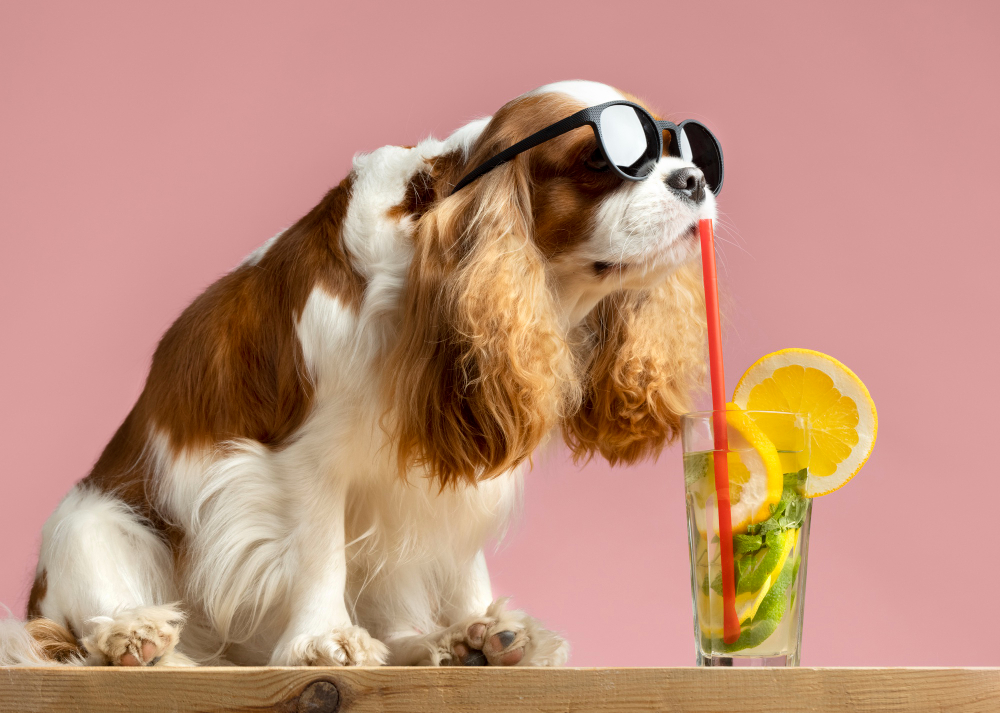Alcohol consumption is a popular social activity for many people, but what about our furry friends? In this article, we will explore the controversial topic of dogs and alcohol. We will address common questions such as can dogs drink whiskey, is alcohol bad for dogs’ skin, and how much alcohol is toxic to dogs. Additionally, we’ll cover what to do if a dog drinks alcohol and dog alcohol poisoning treatment.
Alcohol and Dogs: Chemical Composition, Toxic Effects and Necessary Precautions
The most common and widely consumed alcohol is ethanol, produced through the fermentation of sugars or by the distillation of vegetable raw materials such as grains, fruits or sugar cane. There are other types of alcohols, such as methanol and isopropanol, which have different chemical structures and properties. Alcohol is harmful to dogs and other pets for several reasons. Dogs metabolize alcohol differently than humans, as they have a lower ability to process it. While we humans have specific enzymes to break down alcohol, dogs lack significant amounts of these enzymes, such as alcohol dehydrogenase. When a dog ingests alcohol, it can experience a number of toxic and dangerous effects.
What to Do if a Dog Drinks Alcohol
Risks associated with dogs consuming alcohol
Alcohol can be dangerous for dogs, even in small amounts. It can lead to a variety of health issues, including vomiting, diarrhea, tremors, disorientation, seizures, respiratory failure, and even death. Alcohol can cause central nervous system depression, leading to symptoms such as lack of coordination, lethargy, difficulty breathing and even coma. In more severe cases, alcohol can be fatal for dogs. In addition, alcohol can cause damage to the liver and other organs, as well as serious metabolic disorders. Alcohol consumption can also lead to hypoglycemia (low blood sugar) in dogs, which can be extremely dangerous.
Signs of alcohol poisoning in dogs
If you suspect your dog has consumed alcohol, keep an eye out for these symptoms: vomiting, excessive drooling, unsteady gait, lethargy, tremors, seizures, rapid or irregular heart rate, and labored breathing. At the sign of any symptoms, go to the vet immediately.
Immediate steps to take if a dog ingests alcohol
If your dog ingests alcohol, it’s essential to act quickly. Call your veterinarian or an emergency animal clinic immediately. Do not try to induce vomiting, as this could cause further harm. Keep your dog calm and comfortable while waiting for professional help.
Long-term care and prevention
To prevent accidental alcohol consumption in the future, store alcoholic beverages out of your dog’s reach and keep a watchful eye on your dog during social gatherings where alcohol is present.
Can Dogs Drink Whiskey, Beer, or Other Types of Alcohol?
Investigating different types of alcohol
- Whiskey
Can dogs drink whiskey? The short answer is no. Whiskey contains a higher alcohol content than other beverages, making it particularly dangerous for dogs. - Beer
While beer has a lower alcohol content than whiskey, it is still unsafe for dogs to consume. Hops, a common ingredient in beer, can be toxic to some dogs, causing increased body temperature and rapid heart rate. - Wine
Wine is also unsafe for dogs, as it contains alcohol and grapes, which are toxic to dogs and can lead to kidney failure. - Other alcoholic beverages
No alcoholic beverage is safe for dogs to consume. Always keep these drinks out of their reach and be cautious when enjoying them around your pets.
Assessing the relative risks and dangers of each type
Regardless of the type of alcohol, all alcoholic beverages pose a risk to your dog’s health. It is crucial to prevent your dog from consuming any alcohol to avoid serious health complications.
My Dog Drank Beer, Will He Be OK?
Factors influencing the severity of alcohol poisoning in dogs
- Amount consumed
The amount of alcohol a dog consumes will directly impact the severity of their reaction. Even small amounts can be dangerous, so it’s essential to be vigilant. - Size and weight of the dog
A dog’s size and weight play a role in how severely they are affected by alcohol. Smaller dogs are more susceptible to alcohol poisoning due to their lower body weight. - Alcohol content of the beverage
The higher the alcohol content, the more dangerous it is for your dog. If you suspect your dog has consumed alcohol, it’s crucial to know the type and alcohol content to inform your veterinarian.
Potential outcomes and prognosis
If your dog consumes a small amount of alcohol and receives prompt treatment, they may recover with minimal lasting effects. However, if your dog consumes a large amount or does not receive timely treatment, the consequences can be severe and potentially fatal. It is essential to act quickly and seek professional help if you suspect your dog has consumed alcohol.
Dog Alcohol Poisoning Treatment
Veterinary interventions and care
- Stabilization
Upon arrival at the veterinarian or emergency animal clinic, the first priority is to stabilize your dog. This may include administering fluids to combat dehydration, medications to control seizures, and oxygen therapy to support breathing. - Detoxification
The veterinarian may attempt to remove any remaining alcohol from your dog’s stomach, depending on the circumstances. This process may involve inducing vomiting or administering activated charcoal to absorb the alcohol. - Supportive care
After stabilization and detoxification, your dog may require further supportive care. This can include monitoring vital signs, continuing fluid therapy, and administering medications to alleviate symptoms and prevent complications.
Home care and follow-up treatment
Once your dog is stable and discharged from veterinary care, it’s crucial to follow your veterinarian’s recommendations for home care. This may involve administering medications, providing a special diet, and scheduling follow-up appointments to monitor your dog’s recovery.
Is Alcohol Bad for Dogs’ Skin?
The effects of alcohol on a dog’s skin and coat
Is alcohol bad for dogs’ skin? While alcohol consumption primarily affects a dog’s internal organs, it can also have an impact on their skin and coat. Alcohol can cause dehydration, which may lead to dry, itchy skin and a dull coat. In some cases, alcohol exposure could also cause skin irritation or inflammation.
Potential risks and complications
If your dog’s skin becomes irritated due to alcohol exposure, it’s essential to address the issue promptly. Your veterinarian may recommend topical treatments or medications to alleviate discomfort and prevent complications such as infection.
Preventing Alcohol Exposure in Dogs
Tips for responsible pet ownership
As a responsible pet owner, it’s crucial to ensure that your dog does not have access to alcoholic beverages. This includes storing alcohol out of reach and being cautious during social gatherings where alcohol is present. Additionally, educate friends and family members about the dangers of alcohol to dogs to prevent accidental exposure.
Creating a safe environment for dogs
To create a safe environment for your dog, keep an eye on their surroundings, and be proactive about removing potential hazards. This may include securing alcohol in cabinets or high shelves, using pet gates to limit your dog’s access to certain areas, and closely monitoring your dog’s behavior.
Conclusion
In conclusion, no amount of alcohol is safe for dogs to consume. Alcohol can lead to severe health complications and even death. By being vigilant about preventing your dog’s access to alcoholic beverages and acting quickly if they do consume alcohol, you can help ensure their safety and well-being. For more information on sharing drinks with your dog, check out this article on can you drink apple juice on a dog and visit our guide to dogs and drinks to learn more about keeping your furry friend safe and healthy.

